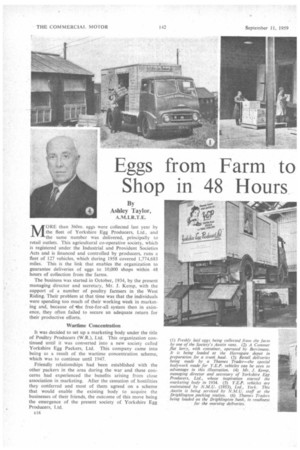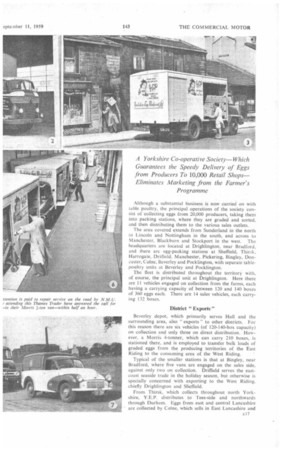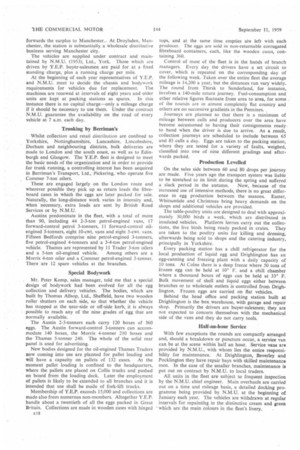Eggs from Farm to Shop in 48 Hours
Page 78

Page 79

Page 80

If you've noticed an error in this article please click here to report it so we can fix it.
By Ashley Taylor,
A.M.I.R.T.E.
MORE than 360m. eggs were collected last year by the fleet of Yorkshire Egg Producers, Ltd., and the same number was delivered, principally to retail outlets. This agricultural co-operative society, which is registered under the Industrial and Provident Societies Acts and is financed and controlled by producers, runs a fleet of 127 vehicles, which during 1958 covered 1,774,683 miles. This is the link that enables the organization to guarantee deliveries of eggs to 10,000 shops within 48 hours of collection from the farms.
The business was started in October, 1934, by the present managing director and secretary, Mr. J. Kemp, with the support of a number of poultry farmers in the West Riding. Their problem at that time was that the individuals were spending too much of their working week in marketing and, because of the free-for-all system then in existence, they often failed to secure an adequate return for their productive efforts.
Wartime Concentration
It was decided to set up a marketing body under the title of Poultry Producers (W.R.), Ltd. This organization continued until it was converted into a new society called Yorkshire Egg Packers, Ltd. This company came into being as a result of the wartime concentration scheme, which was to continue until 1947.
Friendly relationships had been established with the other packers in the area during the war and these concerns had experienced the benefits arising from close association in marketing. After the cessation of hostilities they conferred and most of them agreed on a scheme that would enable the existing body to acquire the businesses of their friends, the outcome of this move being the emergence of the present society of Yorkshire Egg Producers, Ltd. Although a substantial business is now carried on with table poultry, the principal operations of the society consist of collecting eggs from 20,000 producers, taking them into packing stations, where they are graded and sorted, and then distributing them to the various sales outlets.
The area covered extends from Sunderland in the north to Lincoln and Nottingham in the south, and across to Manchester, Blackburn and Stockport in the west. The headquarters are located at Drighlington, near Bradford. and there arc egg-packing stations at Sheffield, Thirsk, Harrogate, Driffield, Manchester, Pickering, Bingley, Doncaster, Colne, Beverley and Pocklington, with separate tablepoultry units at Beverley and Pocklington.
The fleet is distributed throughout the territory with, of course, the principal unit at Drighlington. Here there are 11 vehicles engaged on collection from the farms, each having a carrying capacity of between 120 and 140 boxes of 360 eggs each. There are 14 sales vehicles, each carrying 132 boxes.
District "Exports"
Beverley depot, which primarily serves Hull and the surrounding area, also " exports " to other districts. For this reason there are six vehicles (of 120-140-box capacity) on collection and only three on direct distribution. However, a Morris 4-tonner, which can carry 210 boxes, is stationed there, and is employed to transfer bulk loads of graded eggs from the producing territories of the East Riding to the consuming area of the West Riding.
Typical of the smaller stations is that at Bingley, near Bradford, where five vans are engaged on the sales side, against only two on collection. Driffield serves the eastcoast seaside trade in the holiday season, but otherwise is specially concerned with exporting to the West Riding, chiefly Drighlington and Sheffield.
From Thirsk, which collects throughout north Yorkshire, Y.E.P. distributes to Tees-side and northwards through Durham. Eggs from east and central Lancashire are collected by Colne, which sells in East Lancashire and forwards the surplus to Manchester./ At Droylsden, Manchester, the station is substantially a wholesale distributive business serving Manchester city.
The vehicles are supplied under contract and maintained by N.M.U. (1953), Ltd., York. Those which are driven by Y.E.P. buyer-salesmen are paid for at a fixed standing charge, plus a running charge per mile.
At the beginning of each year representatives of Y.E.P. and N,M.U. meet to decide the chassis and bodywork requirements for vehicles due for replacement. The machines are renewed at intervals of eight years and older units are kept at packing stations as spares. In this instance there is no capital charge—only a mileage charge if it should be necessary to use them. Under the contract N.M.U. guarantee the availability on the road of every vehicle at 7 a.m. each day.
Trunking by Berrintan's
Whilst collection and retail distribution are confined to Yorkshire, Nottinghamshire, Lancashire, Lincolnshire, Durham and neighbouring districts, bulk deliveries are made to London and the south coast, as well as to Edinburgh and Glasgow. The Y.E.P. fleet is designed to meet the basic needs of the organization and in order to provide for trunk running, a controlling interest has been acquired in Berriman's Transport, Ltd., Pickering, who operate five Commer 7-ton oilers.
These are engaged largely on the London route and wherever possible they pick up as return loads the fibreboard cases in which the eggs are later packed for sale. Naturally, the long-distance work varies in intensity and, when necessary, extra loads are sent by British Road Services or by N.M.U.
Austins predominate in the fleet, with a total of more than 90, including 44 2-3-ton petrol-engined vans, 17 forward-control petrol 3-sonnets, 11 forward-control oilengined 3-tonners, eight 10-cwt. vans and eight 5-cwt. vans. Fifteen Bedfords comprise nine petrol-engined 3-tonners, five petrol-engined 4-tonners and a 3-4-ton petrol-engined vehicle. Thames are represented by 11 Trader 3-ton oilers and a 5-ton oil-engined vehicle. Among others are a Morris 4-ton oiler and a Commer petrol-engined 3-tonner. There are 12 spare vehicles at the branches.
Special Bodywork
Mr. Peter Kemp, sales manager, told me that a special design of bodywork had been evolved for all the egg collection and delivery vehicles. The bodies, which are built by Thomas Allsop, Ltd., Sheffield, have two wooden roller shutters on each side, so that whether the vehicle has stopped at the near-side or off-side kerb, it is always possible to reach any of the nine grades of egg that are normally available.
The Austin 2-3-tonners each carry 120 boxes of 360 eggs. The Austin forward-control 3-tonners can accommodate 140 boxes, the Morris 4-tonner 210 boxes and the Thames 5-tonner 240. The whole of the solid rear panel is used for advertising.
New bodies designed for the oil-engined Thames Traders now coining into use are planned for pallet loading and will have a capacity on pallets of 132 cases. At the moment pallet loading is confined to the headquarters, where the pallets are placed on Collis trucks and pushed on board from the loading deck. Later the employment of pallets is likely to be extended to all branches and it is intended that use shall be made of fork-lift trucks.
Membership of Y.E.P. exceeds 15,000 and collections are made also from numerous non-members. Altogether Y.E.P. handle about a twentieth of all the eggs packed in Great Britain, Collections are made in wooden cases with hinged E18 Lops, and at the same time empties are left with each producer. The eggs are sold in non-returnable corrugated fibreboard containers, each, like the wooden cases, containing 360.
Control of most of the fleet is in the hands of branch managers. Every day the drivers have a set circuit to cover, which is repeated on the corresponding day of the following week. Taken over the entire fleet the average mileage is 14,200 a year, but the distances run vary widely. The round from Thirsk to Sunderland, for instance, involves a 140-mile return journey. Fuel-consumption and other relative figures fluctuate from area to area, for some of the rounds are in almost completely liat country and others are on successive gradients in the Pennines.
Journeys are planned so that there is a minimum of mileage between calls and producers over the area have become accustomed to having their consignments ready, to hand when the driver is due to arrive. As a result, collection journeys are scheduled to include between 65 and 85 calls a day, Eggs are taken to the packing station, where they are tested for a variety of faults, weighed, classified into one of nine different gradings and afterwards packed.
Production Levelled
On the sales side between 60 and 80 drops per journey are made. Five years ago the transport system was liable to be stretched to its limit during the spring and suffered a slack period in the autumn. Now, because of the increased use of intensive methods, there is no great difference in egg production between the seasons. Easter, Whitsuntide and Christmas bring heavy demands on the shops and additional vehicles are provided.
The table-poultry units are designed to deal with approximately 30,000 birds a week, which are distributed in insulated vehicles. Platform lorries carry out the collections, the live birds being ready packed in crates. They are taken to the poultry units for killing and dressing, afterwards being sold to shops and the catering industry, principally in Yorkshire.
Every packing station has a chill refrigerator for the local production of liquid egg and Drighlington has an egg-canning and freezing plant with a daily capacity of 10 tons. At Colne there is a deep freeze where 50 tons of frozen egg can be held at 10° F. and a chill chamber where a thousand boxes of eggs can be held at 33° F. Bulk movement of shell and liquid eggs either between branches or to wholesale outlets is controlled from Drighlington. Frozen eggs are carried on flat vehicles.
Behind the head office and packing station built at Drighlington is the box warehouse, with garage and repair shop. Primarily the drivers are buyer-salesmen; they are not expected to concern themselves with the mechanical side of the vans and they do not carry tools.
Half-an-hour Service With few exceptions the rounds are compactly arranged and, should a breakdown or puncture occur, a service van can be at the scene within half an hour. Service vans are provided by N.M.U., with whom lies the entire responsibility for maintenance. At Drighlington, Beverley and Pocklington they have repair bays with skilled maintenance men. In the case of the smaller branches, maintenance is put out on contract by N.M.U. to local traders.
All units in the fleet are subject to frequent inspection by the N.M.U. chief engineer. Main overhauls are carried out on a time and mileage basis, a detailed docking programme being provided by N.M.U. at the beginning of January each year. The vehicles are withdrawn at regular intervals for repainting in the distinctive cream and green which are the main colours in the fleet's livery.




























































































































































